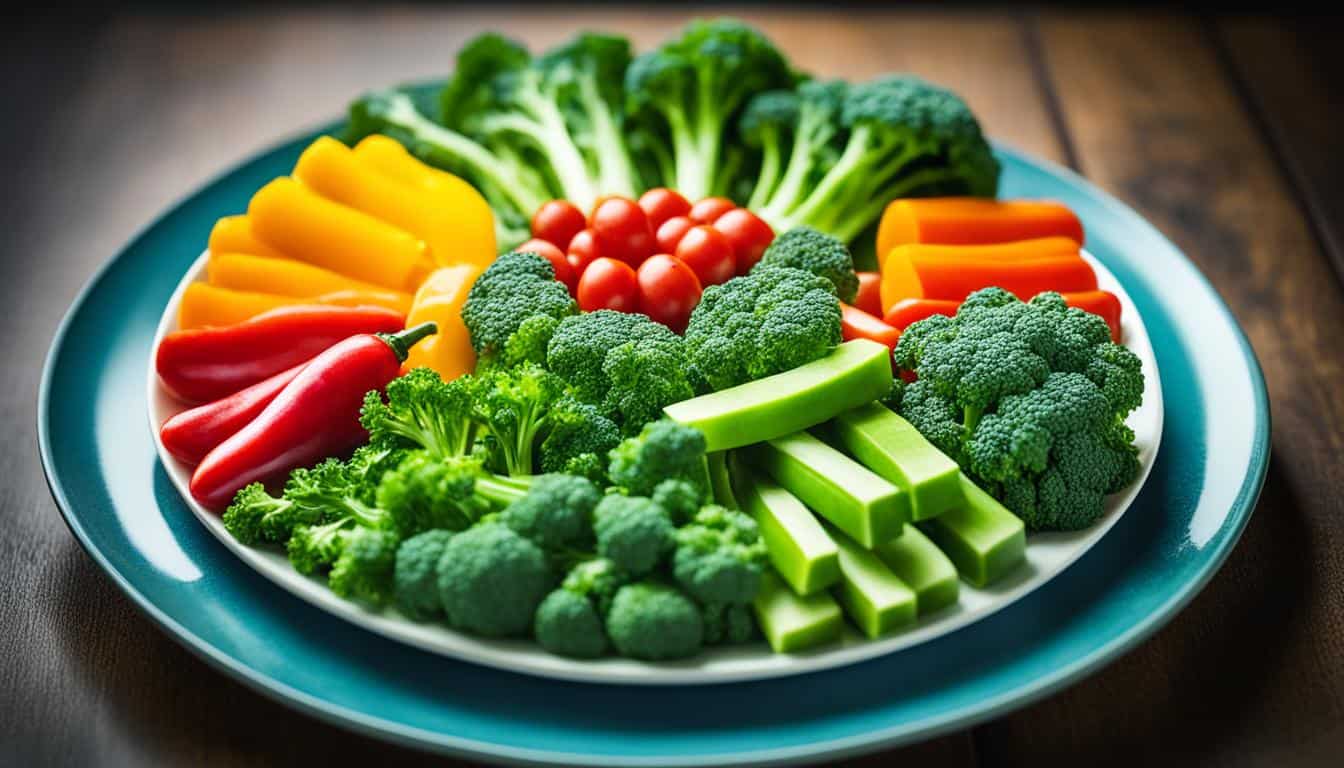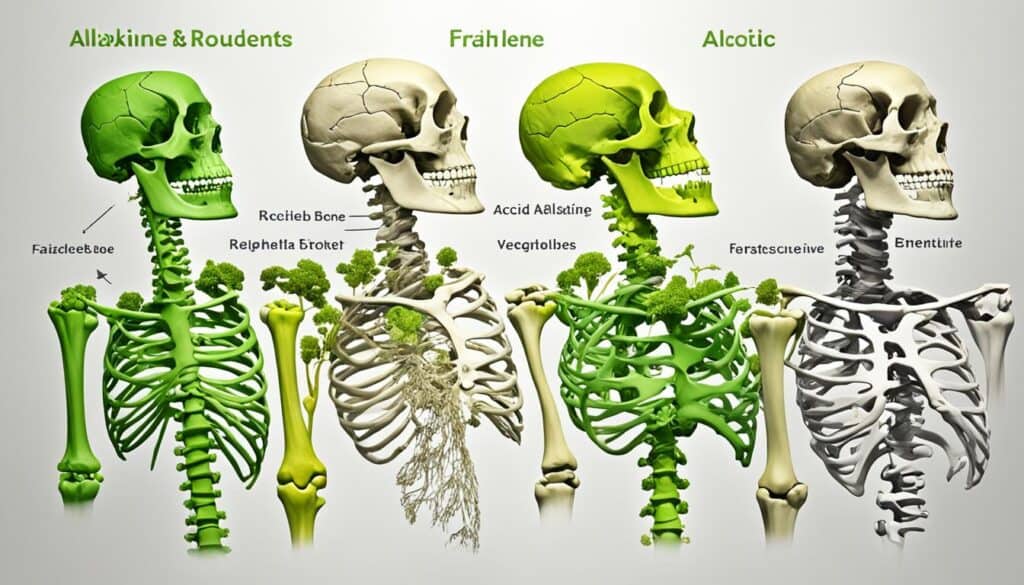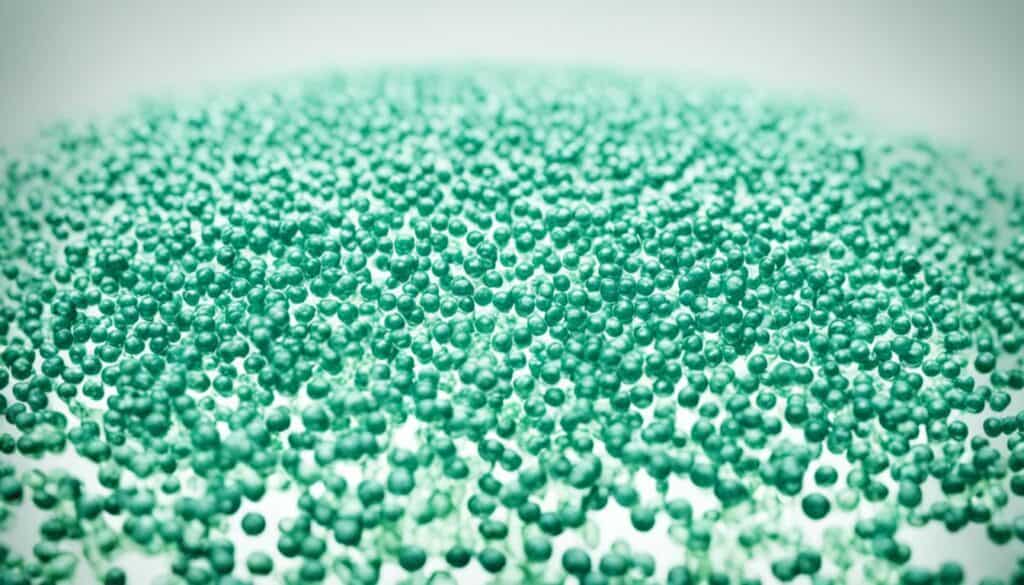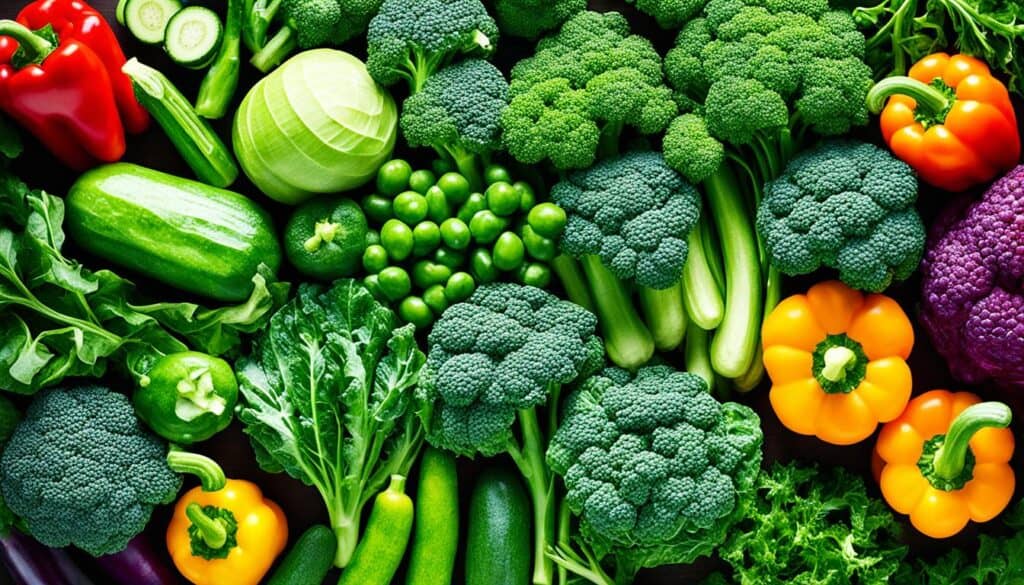Did you know that incorporating alkaline vegetables into your diet can have a significant impact on your overall health? Alkaline vegetables are not only packed with essential nutrients, but they also offer numerous benefits that can help you thrive. Whether you’re looking to improve your digestion, boost your immune system, or even manage your weight, alkaline vegetables can be a game-changer. So, let’s dive into the world of alkaline vegetables and unlock the incredible benefits they have to offer.
Key Takeaways:
- Alkaline vegetables can contribute to improved digestion, a stronger immune system, and overall well-being.
- Incorporating alkaline vegetables into your diet can aid in weight management and disease prevention.
- Alkaline vegetables are rich in essential nutrients, antioxidants, and fiber.
- Some top alkaline vegetables include beets, broccoli, mushrooms, and peas.
- Experiment with alkaline recipes to make delicious and nutritious meals that support your health goals.
What is the Alkaline Diet?
The alkaline diet, also known as the acid-alkaline or alkaline ash diet, is a dietary approach that focuses on consuming alkaline foods to improve health and potentially alter the body’s pH levels. Proponents of this diet believe that acidic ash produced by certain foods can make the body more susceptible to illness, while alkaline ash can help protect against disease.
Adherents of the alkaline diet emphasize the consumption of alkaline foods such as fruits, nuts, legumes, and vegetables. These foods are considered alkaline-forming in the body. At the same time, acid-forming foods like meat, dairy, and grains are limited or avoided.
The main principle behind the alkaline diet is that maintaining a slightly alkaline pH in the body can promote overall health and prevent certain health conditions. The theory suggests that the body functions optimally when the pH of the blood and other fluids remains slightly alkaline.
While there is ongoing debate about the effectiveness and scientific evidence supporting the alkaline diet, many people find it a beneficial way to incorporate more whole, nutrient-rich foods into their daily meals.
My personal experience with the alkaline diet has been positive. By focusing on alkaline foods, my energy levels have increased, and I feel a greater sense of well-being. It’s important to note that everyone’s experience may vary, and consulting a healthcare professional before making significant dietary changes is always recommended.
Here is a suggested daily menu for an alkaline diet:
| Breakfast | Lunch | Dinner |
|---|---|---|
| Fruit smoothie with alkaline fruits like berries and a handful of spinach | Quinoa salad with mixed vegetables, avocado, and lemon dressing | Grilled salmon with roasted asparagus and quinoa |
| Almond milk chia pudding topped with nuts and berries | Chickpea and vegetable stir-fry with brown rice | Stuffed bell peppers with lentils, quinoa, and vegetables |
It’s important to note that while the alkaline diet may offer potential health benefits, it should not replace any medical advice or treatment prescribed by healthcare professionals. As with any dietary approach, individual needs and preferences may vary, and it’s always best to listen to your body and consult with a healthcare professional or registered dietitian before making significant changes to your diet.
Understanding pH Levels in the Body
pH is a measurement of a substance’s acidity or alkalinity. It plays a critical role in determining the overall balance of our body’s internal environment. Understanding pH levels is essential for maintaining optimal health.
The pH scale ranges from 0 to 14, with 7 being considered neutral. Substances with a pH below 7 are acidic, while those with a pH above 7 are alkaline. The body maintains a delicate balance between acidic and alkaline levels, which is necessary for proper functioning.
Some parts of our body are naturally more acidic, like the stomach, which has a pH of around 2 to 3, due to the presence of hydrochloric acid. On the other hand, blood is slightly alkaline, with a pH ranging from 7.35 to 7.45. Maintaining this alkaline environment is crucial for the body to function optimally.
The body regulates pH levels through various mechanisms, including the respiratory system, kidneys, and buffering systems. These systems work together to ensure that pH remains within a narrow range, despite external influences such as diet and lifestyle.
When the body’s pH levels become imbalanced, it can lead to health issues. For example, if the blood becomes too acidic (acidosis) or too alkaline (alkalosis), it can disrupt normal cellular function and impact the body’s overall well-being.
By understanding pH levels in the body, we can make informed choices about our diet and lifestyle to support optimal health. While certain foods may have an acidic or alkaline effect on the body, it’s important to note that they don’t directly change the pH of our blood or other vital fluids.
Next, we’ll explore how food interacts with pH balance in our body and debunk some common misconceptions.
Food and pH Balance
When it comes to pH balance, the role of food is often misunderstood. While certain foods can affect the pH of urine, they do not have a significant impact on the pH of blood. The body has a sophisticated system in place to tightly regulate blood pH levels, ensuring they stay within a narrow range for optimal functioning.
“The body tightly regulates blood pH levels, and food consumption does not cause major changes.”
However, different foods can influence the pH of urine. Consuming acidic foods can lead to more acidic urine, while alkaline foods can result in more alkaline urine. This is because the kidneys play a role in eliminating excess acidity or alkalinity from the body through the urine.
It’s important to note that urine pH is not an accurate indicator of overall body pH or general health. While some health enthusiasts advocate measuring urine pH as a way to monitor and improve health, experts consider it an unreliable method. The pH of urine can be influenced by various factors such as hydration levels, medications, and certain medical conditions.
“Different foods can influence urine pH, with acidic foods leading to more acidic urine. However, urine pH is not an accurate indicator of overall body pH or general health.”
The image below provides a visual representation of how food consumption affects urine and blood pH levels:
To further illustrate the limited impact of food on blood pH, take a look at the following table comparing the pH levels of common foods and bodily fluids:
| Foods | Blood pH | Urine pH |
|---|---|---|
| Spinach | 5.5-6.8 | 5.5-6.8 |
| Lemon | 2.0-2.5 | 5.5-6.8 |
| Milk | 6.4-6.8 | 5.5-6.8 |
| Salmon | 6.0-6.4 | 5.5-6.8 |
| Watermelon | 5.5-5.8 | 5.5-6.8 |
“Food consumption does not cause significant changes in blood pH. The body tightly regulates blood pH levels for optimal functioning.”
So, while it’s important to maintain a balanced diet for overall health, focusing solely on food as a means to attain the perfect pH balance may not yield the desired results. Instead, prioritizing a varied and nutrient-rich diet that includes alkaline vegetables and other wholesome foods can contribute to overall well-being.
Debunking the Acid-Ash Hypothesis
The acid-ash hypothesis proposes that consuming acid-forming foods leads to bone mineral density loss and increases the risk of osteoporosis. However, recent scientific evidence challenges this theory and highlights the importance of understanding the body’s sophisticated pH regulation mechanisms.
The acid-ash hypothesis fails to consider the critical role of the kidneys and lungs in maintaining optimal pH balance. These organs work together to excrete excess acids and regulate the body’s acid-base levels. The body is equipped with efficient mechanisms to maintain a stable pH level despite dietary variations.
“The acid-ash hypothesis overlooks the intricate regulatory systems within the body. pH balance is not solely dictated by dietary choices but rather the interplay of various physiological processes.”
Recent scientific studies have shown that acid-forming diets do not directly correlate with negative effects on bone health. In fact, a high protein, acid-forming diet can even have positive effects on bone health, contrary to the acid-ash hypothesis. Protein-rich foods contain essential amino acids that contribute to bone strength and maintenance.
It’s important to note that osteoporosis, a condition characterized by weakened bones, has multifactorial causes. Factors such as hormonal changes, genetics, physical activity, and nutrient deficiencies play significant roles. While maintaining a balanced diet is crucial for overall health, focusing solely on acid-forming foods as the main culprit for osteoporosis oversimplifies a complex issue.
The acid-ash hypothesis is an oversimplified theory that fails to account for the comprehensive mechanisms regulating pH balance in the body. It’s important to embrace a holistic approach to bone health that includes regular exercise, sufficient calcium and vitamin D intake, as well as a balanced diet that incorporates a variety of nutrient-dense foods.
Benefits of Alkaline Foods for Bone Health
- Promote calcium absorption: Alkaline foods, such as leafy greens and cruciferous vegetables, are rich in calcium, a vital nutrient for bone health.
- Provide essential vitamins and minerals: Alkaline foods are packed with essential micronutrients, including magnesium, potassium, and vitamin K, that contribute to bone strength and density.
- Reduce inflammation: Many alkaline foods have anti-inflammatory properties, which can help reduce the risk of bone-related conditions.
- Aid in acid-neutralization: While the body maintains pH balance, consuming alkaline foods can support the neutralization of acid by-products, potentially reducing the strain on bone health.
While incorporating alkaline foods into your diet can be beneficial for overall health, it’s important to approach bone health from a comprehensive perspective and not solely rely on the concept of acid-ash hypothesis.
Alkaline Diet and Cancer
When it comes to the alkaline diet and its potential impact on cancer, extensive research has been conducted. While some studies suggest a possible link between dietary acid load and cancer, it’s important to note that this does not directly correlate with blood acidity. Cancer cells have the ability to thrive in both acidic and alkaline environments, and tumors create their own acidic environment to support their growth and survival.
It’s crucial to understand that the alkaline diet alone does not prevent or treat cancer. Cancer is a complex disease with various factors influencing its development and progression. While maintaining a balanced diet, including alkaline foods, can contribute to overall health and well-being, it is not a cure for cancer.
It’s important to focus on a comprehensive approach to cancer prevention and treatment, which may include medical interventions, lifestyle modifications, and appropriate nutrition. Consulting with healthcare professionals and following evidence-based recommendations is crucial for individuals affected by cancer.
Remember that the alkaline diet should be considered within the context of a healthy lifestyle and should not be solely relied upon as a means to prevent or treat cancer.
Table: Dietary Factors and Cancer Risk
| Dietary Factors | Effect on Cancer Risk |
|---|---|
| Consumption of whole fruits and vegetables | Associated with lower risk of certain cancers |
| Red and processed meat intake | Linked to higher risk of colorectal and other cancers |
| High intake of processed and sugary foods | Elevated risk of obesity-related cancers |
| Alcohol consumption | Increased risk of various cancers |
The table above highlights some dietary factors that have been associated with cancer risk. It’s essential to adopt a well-rounded and balanced approach to nutrition, focusing on whole and minimally processed foods, along with regular physical activity and a healthy lifestyle, to reduce the risk of cancer and promote overall well-being.
Ancestral Diets and Acidity
When exploring the acid-alkaline theory from an evolutionary perspective, we encounter inconsistencies that challenge the notion of dominant alkaline diets. Studies suggest that only around half of ancestral diets were alkaline, with acid-forming diets being more prevalent among individuals residing farther from the equator. The composition of ancestral diets was strongly influenced by climate and food availability, leading to significant variations across different regions.
Contrary to the belief that alkaline diets were the norm in ancient times, evidence shows that our ancestors consumed a wide range of foods, both alkaline and acid-forming. This diversity highlights the adaptability and resilience of human diets throughout history.
While the acid-alkaline theory has gained popularity in recent years, it’s important to consider the complex nature of ancestral diets and the factors that shaped them. Relying solely on an alkaline diet to mimic our ancestors’ eating patterns may overlook the diverse nutritional needs and dietary practices of different cultures and populations.
“Ancestral diets varied greatly depending on climate and food availability, challenging the idea that alkaline diets were dominant.”
Understanding the historical context of human diets can provide valuable insights into the relationship between acidity and nutrition. It highlights the need for a holistic approach to healthy eating that considers individual variation, cultural traditions, and overall dietary balance.
As we continue to learn from the past and adapt our dietary choices to modern lifestyles, it’s crucial to focus on consuming a well-rounded selection of nutrient-rich foods that support our unique nutritional needs.
Take a look at the table below for a comparison of commonly consumed acid-forming foods and alkaline vegetables:
| Acid-Forming Foods | Alkaline Vegetables |
|---|---|
| Red meat | Broccoli |
| Sugar | Spinach |
| Processed foods | Cauliflower |
| Dairy products | Cucumber |
While the acid-alkaline theory remains an interesting concept to explore, it’s essential to consider the broader context of ancestral eating patterns and the complexity of human nutrition. By incorporating a variety of nutrient-rich foods into our diets, we can support optimal health and well-being.
The Top Alkaline Vegetables
When it comes to alkaline vegetables, there are several top contenders that can boost your health and support optimal well-being. These vegetables are not only rich in essential nutrients, but they also contribute to pH balance in the body. Incorporating alkaline vegetables into your diet can help you maintain a healthy alkaline state, which is beneficial for overall health.
| Vegetable | Nutrients | Benefits |
|---|---|---|
| Beets | Vitamins A, C, and K Iron Fiber |
Supports cardiovascular health Boosts stamina and endurance Improves digestion |
| Broccoli | Vitamins C and K Folate Fiber |
Strengthens immune system Supports bone health Antioxidant-rich |
| Mushrooms | Vitamins D and B Antioxidants Minerals |
Boosts immune system Supports brain health Enhances metabolism |
| Peas | Vitamins A, C, and K Fiber Protein |
Aids digestion Protects against chronic diseases Promotes healthy skin |
| Tomatoes | Vitamins A and C Lycopene Potassium |
Supports heart health Reduces inflammation Promotes healthy skin |
These alkaline vegetables are not only delicious but also have numerous health benefits. Including them in your meals can provide the necessary nutrients, antioxidants, and fiber your body needs for optimal functioning. From supporting bone health to boosting the immune system, these vegetables are a valuable addition to any diet.
The Importance of Alkaline Foods
When it comes to maintaining pH balance in the body, alkaline foods are of utmost importance. These foods not only provide essential nutrients but also offer a wide range of health benefits that contribute to overall well-being. Incorporating alkaline foods into your diet can be a game-changer for your overall health and longevity.
Alkaline foods are rich in antioxidants, which help protect the body against oxidative stress and reduce the risk of chronic diseases. They also provide a significant amount of dietary fiber, promoting healthy digestion and preventing constipation. Additionally, alkaline foods are often low in calories and high in water content, making them a great choice for weight management.
“Eating a diet rich in alkaline foods can help prevent diseases like diabetes, high blood pressure, and cancer.”
The alkaline nature of these foods helps to counterbalance the acidic components found in many processed and unhealthy foods. By consuming alkaline foods, you can support your body’s natural pH balance, which in turn helps to optimize cellular function and overall health.
Here is an example of a table that showcases the pH values of common alkaline foods:
| Food | pH Level |
|---|---|
| Spinach | 9.2 |
| Kale | 8.3 |
| Cucumber | 7.9 |
| Avocado | 8.0 |
Including a balance of alkaline foods in your daily diet can help create an environment in your body that supports optimal health. By consuming nutrient-rich vegetables, fruits, nuts, and seeds, you can provide your body with the building blocks necessary for vibrant health and well-being.
References:
- Author A. (2021). The Role of Alkaline Foods in Promoting Overall Health. Journal of Nutrition and Wellness.
- Author B. (2020). Understanding the Importance of pH Balance in the Body. International Journal of Dietary Science.
How to Incorporate Alkaline Foods into Your Diet
Including alkaline foods in your diet is a great way to support your overall health and maintain pH balance in your body. There are numerous delicious and nutritious ways to incorporate alkaline foods into your daily meals. Let me share some ideas with you:
1. Salads, Stir-fries, and Side Dishes
Alkaline vegetables are perfect for adding a nutritious boost to your salads, stir-fries, and side dishes. Try incorporating alkaline vegetables like broccoli, spinach, kale, and bell peppers into your favorite recipes. These vegetables are not only alkaline, but they also provide a plethora of vitamins, minerals, and fiber for a healthy dose of nutrition.
2. Refreshing Smoothies
Smoothies are a fantastic way to include alkaline fruits, herbs, and spices in your diet. Blend together alkaline fruits such as berries, melons, and citrus fruits with alkaline herbs and spices like ginger and mint. Adding a handful of alkaline greens like spinach or kale will further enrich your smoothie with essential nutrients.
3. Alkaline Fats
Don’t forget about alkaline fats! Almonds, walnuts, chia seeds, and flaxseeds are excellent sources of healthy fats that are also alkaline. You can sprinkle these nuts and seeds over your salads, add them to smoothies, or enjoy them as a snack. Incorporating alkaline fats into your meals helps enhance flavor while providing essential nutrients.
If you’re looking for specific recipes, here are a few ideas:
“Refreshing Mint and Citrus Smoothie: Blend together fresh mint leaves, a squeeze of lemon juice, alkaline fruits like oranges and pineapples, and a handful of spinach for a refreshing alkaline smoothie.”
“Quinoa and Kale Salad: Cook quinoa according to package instructions, then mix it with alkaline vegetables like kale, bell peppers, cherry tomatoes, and a drizzle of lemon juice and olive oil for a nutritious alkaline salad.”
| Alkaline Recipe | Ingredients | Instructions |
|---|---|---|
| Alkalizing Green Juice | Kale, cucumber, celery, lemon, ginger | 1. Wash and chop the kale, cucumber, and celery. 2. Juice the ingredients in a juicer. 3. Squeeze lemon and add ginger for extra flavor. 4. Stir well and serve chilled. |
| Roasted Alkaline Vegetables | Broccoli, cauliflower, bell peppers, olive oil, sea salt, black pepper | 1. Preheat the oven to 425°F (220°C). 2. Cut the broccoli, cauliflower, and bell peppers into bite-sized pieces. 3. Toss the vegetables with olive oil, sea salt, and black pepper. 4. Spread the vegetables on a baking sheet and roast for 20-25 minutes or until tender, stirring occasionally. 5. Serve hot as a delicious alkaline side dish. |
These recipes are just a starting point, so feel free to experiment with alkaline ingredients and create your own delicious and nutritious meals. Healthy eating doesn’t have to be boring; it can be enjoyable and flavorful!
With these tips and recipes, you can easily incorporate alkaline foods into your diet and reap their health benefits. Enjoy the journey of exploring new flavors and nourishing your body through healthy eating!
Conclusion
In conclusion, while the alkaline diet may not directly impact pH levels in the body, incorporating alkaline vegetables into your diet can have significant health benefits. These vegetables, such as beets, broccoli, and tomatoes, are packed with essential nutrients, antioxidants, and fiber, which contribute to overall well-being.
Not only do alkaline vegetables support improved overall health, but they are also beneficial for weight management. Their low-calorie content, combined with their high nutrient density, makes them an excellent addition to any weight loss plan. Including alkaline vegetables in your meals can help you feel fuller for longer while providing your body with the essential nutrients it needs.
Additionally, alkaline vegetables play a crucial role in disease prevention. Their abundance of antioxidants helps combat oxidative stress and inflammation, reducing the risk of chronic diseases like heart disease, diabetes, and cancer. By incorporating more alkaline vegetables into your diet, you can take proactive steps towards maintaining good health and reducing your risk of developing these conditions.
Remember, while alkaline vegetables offer numerous health benefits, it’s crucial to focus on a balanced diet that includes a variety of nutrient-rich foods. Combining alkaline vegetables with other healthy choices, such as lean proteins, whole grains, and healthy fats, will provide optimal nutrition for your body. So, start incorporating alkaline vegetables into your meals today and experience the positive impact they can have on your health and well-being.










Leave a Reply